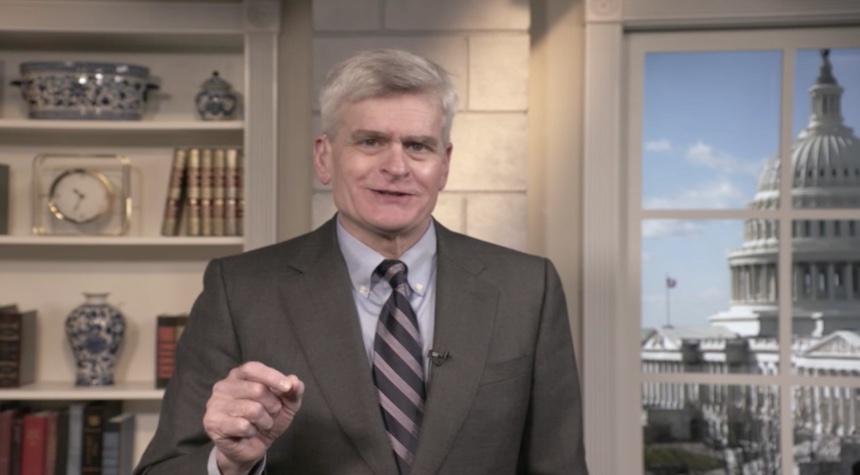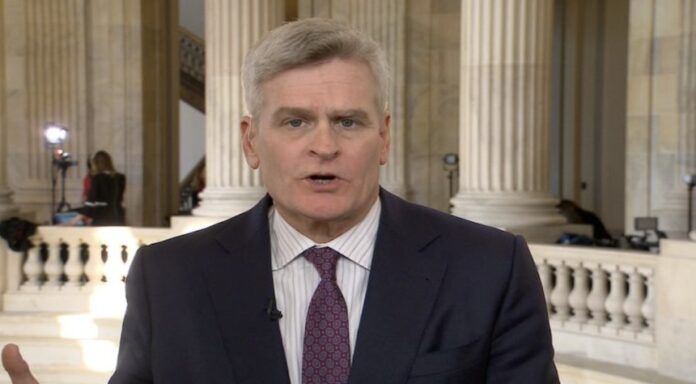Bill Cassidy, a conservative U.S. senator who was pro-Trump in 2020, ran for reelection. He was re-elected and then voted against Donald Trump’s impeachment for the riot that occurred at the U.S. Capitol in January.
Cassidy is not loved by many Republicans in Louisiana after he voted to convict Trump.
He was a supporter of Biden’s massive Infrastructure Bill, even though he didn’t know what it contained.
Cassidy said that the portion of the law that states, “The term per-mile user fees” means a revenue mechanisms that – are applied to road users who operate motor vehicles on surface transportation systems; and are based on vehicle miles traveled by a road user,” was not included.
Cassidy said, “It isn’t in there”, insisting on the fact that the proposed per-mile tax mentioned in Section 13002 does not exist. “That is not in there.”
When the exact words of the bill were read to him, he seemed to change his tune. “There’s that section, this is not the section that I wrote.” Cassidy said: “But I promise you that there is no fee for the user.” It’s just a test. “They could be taking vehicles belonging to the federal government and we want to see how it works.”

Cassidy has also spoken out against sending National Guard troops along the border, something that Jeff Landry is doing as the governor of his state.
He attacked Trump and conservatives for the language “5000 illegals per day”, insisting that it was not in the bill, and shouting “Don’t Be Ignorant! “Read the bill!”
Note: After reading the text of the bill, this language is in fact in the bill.
There’s another possible reason for Louisiana Republicans to have a problem.
Cassidy, for at least five consecutive years, has tried to rein in the 340B Drug Discount Program, which, as we have previously mentioned, now benefits rural, working-class people in red states, like Louisiana. Cassidy supporters would argue that his efforts are so extreme that he should be referred to as “killing the program,” rather than “reining in.”
Cassidy has been opposed to the program for a long time. In 2018, he proposed a bill that would have prohibited hospitals from enrolling in 340B programs for at least two years. In his press release, it says: “The bill would ban new enrollments into the 340B Program for at least two years…”
Cassidy complained in an op-ed published on July 20, 2023, that the 340B program “costs the pharmaceutical companies billions” at a moment when conservatives were pointing out the profits that Big Pharma made as a result of vaccine mandates and new anti-obesity medications.

Cassidy cites an op/ed by a former employee of Big Pharma who worked at Merck, a Pfizer-owned company, and others. This individual worked for the Community Oncology Alliance which is heavily funded by Big Pharma. I am sure it’s no coincidence that they oppose the 340B Drug Discount Program.
Here’s the Community Oncology Alliance managing director reposting a Boston Herald op-ed about the need to “kill” 340B.
In 2024, Cassidy is still pursuing the 340B investigation as a personal crusade.
Three things make this odd. As noted, this seems to be at odds with the priorities and politics of the state that he represents. Cassidy, a former doctor, used to be employed by a 340B company. Third, it is the pharmaceutical industry that has been most focused on dismantling 340B. Cassidy, a physician and not a representative of a pharmaceutical firm, is the one who made this claim. What’s the story?
It’s always worth looking at the financial interests in Washington, DC. Cassidy has a variety of reasons, both financial and non-financial, to align with Big Pharma in the 340B program from 2018-2024.
Reviewing various financial disclosure documents, it appears Cassidy’s wife held between $1,000 to $15,000 of Novartis (and made multiple transactions with Novartis) between early 2019 and the end of 2018.
She also owned Amgen stock, which she sold in two tranches: $1,000 to $15,000 in December 2018 and $1,000 to $15,000 in November 2019.
She bought Johnson & Johnson shares between $1,000 and $15,000. Around that time, I wonder if anyone started working on a pharmaceutical product that the government would try to mandate all of us to get and which could yield huge profits for shareholders.

The filings available at the time the search was conducted do not indicate when Cassidy’s wife sold that stock. However, it appears that at some point after 2020, the Cassidys moved all of their investments to funds rather than individual stocks. This is probably smart because it makes the questioning of Cassidy about his possible financial motives behind certain policy moves more difficult.
Cassidy and his wife are reportedly investing between $50,001 and $100,000 in Vanguard’s Wellesley Income Admiral Fund. What are the investments of that fund? Three of the fund’s top nine holdings are pharmaceutical companies.
This is not to say Cassidy wants to undermine 340B to make himself richer. (Although, to be clear: it would at least make his wife richer). This is not to say Cassidy is trying to undermine 340B because it will make him richer (though to be clear, at least his wife would become wealthy).
In politics, optics are important. Cassidy’s position as one of the most aggressive opponents of 340B is not good, given the demographics in his state, his GOP base, and his family’s investment. It may be necessary to do some cleaning up.


